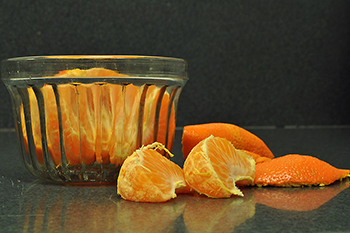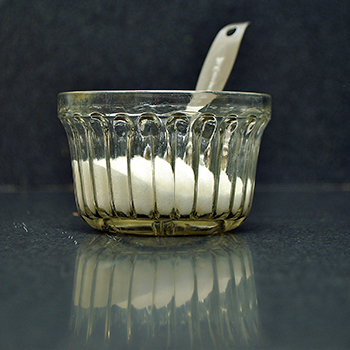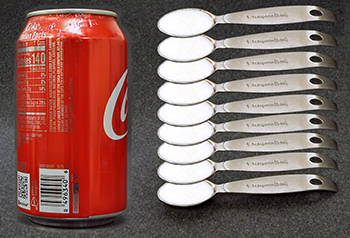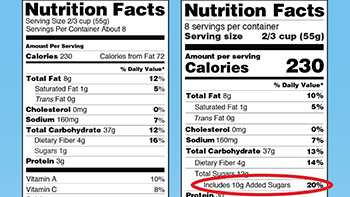Should You Avoid Sugars in Fruit and Milk for Weight Loss
Return to Heath and Nutrition Agent Articles

Added sugars VS natural sugars
Americans, on average, eat way too much sugar — about 17 extra teaspoons beyond the recommended limit. Most of that sugar comes from processed food sources including cookies, candy, sodas, sweetened ready-to-eat cereals, ice cream, and also condiments, bread and sweetened yogurts. But these foods are made sweet due to added sugars.
There are some foods that are sweet because they have natural sugars, like fruit and milk. These naturally sweet foods also have beneficial things like vitamins, minerals and fiber that the body loves and is necessary for good health.
The fiber in these foods also helps slow down their digestibility which helps slow the release of sugars into the bloodstream. They don't create the spike (and then dip) in insulin levels that happens when we eat foods with lots of added sugars that flood into the bloodstream quickly.
The correlation between fruits and vegetables, diseases and weight
Some diets like paleo, keto, carnivore (zero carb) and pegan profess that sugar, regardless of the source, should be avoided entirely. Some have even labeled fruit as toxic.
Is this valid, given how over-sugared we are in this country? Well, not if we want to be healthy.
A recently published study confirms that consuming the recommended amounts of fruits and vegetables is beneficial for guarding against the development of diseases including cancers. As a nation, our current consumption of produce is very low. This study indicates this as a risk factor for developing diseases, including cancer. Another study showed a correlation between low consumption of fruits and vegetable and obesity in teenage boys.
Recent reports have raised concerns not only about what we are eating too much of, but what we’re not eating enough of — fruits and vegetables. When we eat too much sugar, we may not be eating enough nutritious food so our bodies (even overweight ones) may be malnourished because of the lack of vitamins and minerals.
Is sugar — all sugar — bad?
But is sugar really that bad? Like everything else, the dose makes the poison. Our bodies certainly don’t need a lot of it. Too much will impact our health by way of cavities, type II diabetes, weight gain and cardiovascular disease.
Studies indicate that sugars consumed in their natural sources (fruits, vegetables, grains, dairy products) do not impact health. But, when that sugar is removed from its original source to be refined and then added to sweeten other processed products, then minimizing our intake would be wise.
How much sugar should I get per day?
 So how much is too much? The Dietary Guidelines for Americans recommends that 10% of our total calorie intake should come from added sugars.
So how much is too much? The Dietary Guidelines for Americans recommends that 10% of our total calorie intake should come from added sugars.
For someone on a 2,000 calorie diet, that equals almost 12 teaspoons or 50 grams of added sugar per day, which seems like a lot.
But, the average American consumes approximately 25 teaspoons (100 grams) of added sugar per day — more than double the Guideline recommendation, and that's IF you are consuming 2K calories a day, the typical recommendation for an adult male.
 It quickly adds up!
It quickly adds up!
ONE 12-ounce can of soda has approximately 9 teaspoons (37 grams) of added sugar.
ONE 16-ounce energy drink contains the maximum 12 teaspoons (51 grams) of added sugar. Again, that’s ONE energy drink.
The American Heart Association takes it further by recommending less than 9 teaspoons for men per day and less than 6 teaspoons for women and children.
 Labeling sugars in food
Labeling sugars in food
But how can you tell if the food you’re eating is naturally sweet or enhanced with added sugars?
The FDA now requires that all products list the added sugars (separated out from the total sugar content) per serving on the Nutrition Facts label.
Sources:
- Tufts University Health & Nutrition Letter Special Supplement. “Added Sugars: The Facts about Caloric Sweeteners.” (Feb. 2019)
- Dennett, C. (2019, April 16). The sugar in fruit doesn’t make it bad for you, despite some trendy diet claims . Washington Post, retrieved from Accessed 4/18/19
- Yip C, Chan W, Fielding R. (2019). The associations of fruit and vegetable intakes with burden of diseases: a systematic review of meta-analyses. Journal of the Academy of Nutrition and Dietetics, 119(3), 464-481. Accessed 4/18/19.
- Zalewska M, Maciorkowska E. (2017). Selected nutritional habits of teenagers associated with overweight and obesity. PeerJ, 5. doi: 10.7717/peerj.3681. Accessed 4/18/19
Want more great food tips, recipes and nutrition info?
Sign up to receive In Good Health each month in your email inbox.